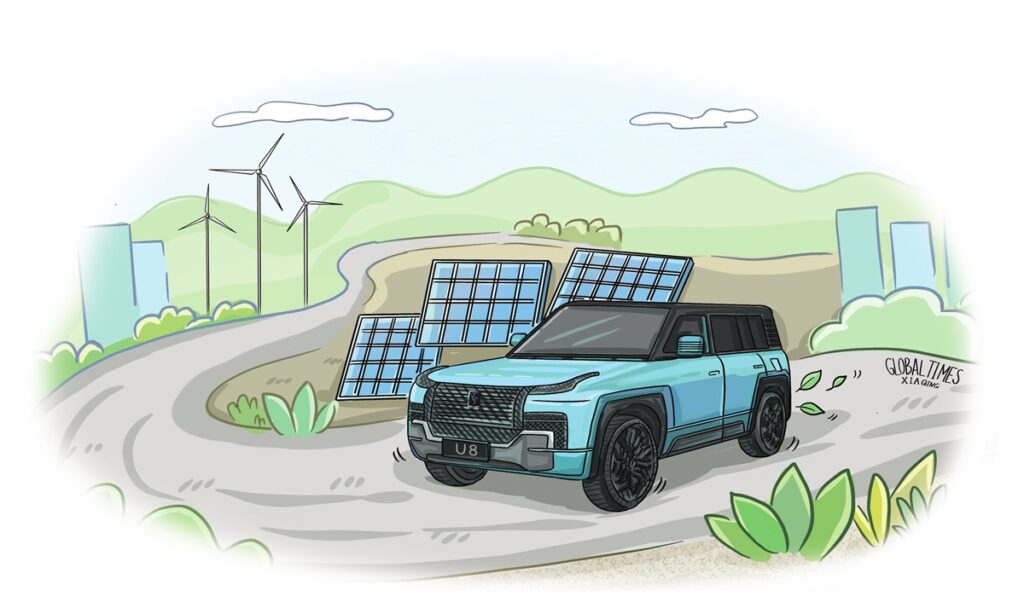The trend of Chinese automakers seeing Mexico as a way to enter the American electric vehicle (EV) market is drawing attention and concern among some US media outlets, but this flexibility actually underscores the resilience of the Chinese vehicle industry, despite US protectionism.
For instance, Chinese EV makers have targeted the US market through heavy investments in Mexico, which, with its proximity to the US market and tariff advantages under the new United States-Mexico-Canada Agreement (USMCA), has become a new hub attracting capital for auto manufacturing.
It’s especially a new choice for Chinese companies, according to a report on the VOA Chinese website on Wednesday.
But the report also mentioned the risk that US lawmakers could change the rules of the game at any time if they see China taking advantage of Mexico’s favorable tariff conditions.
While the risk cannot be completely ruled out, it won’t stop Chinese EV makers from continuously trying to expand their global market share amid increasingly fierce competition, especially when the US EV market largely remains to be explored due to the high costs.
The shift and investment by Chinese EV makers in Mexico just underscores the competitiveness and resilience of China’s auto industry. This is another proof of why the unilateral US manipulation of “decoupling” may cause trouble, but it cannot stifle the development of China’s manufacturing industry chain.
Under current circumstances, it is totally justified for Mexico to become a hot spot for investment by Chinese EV makers.
Mexico enjoys favorable tariff conditions under the USMCA, which specifies that automakers can import cars tax-free as long as 75 percent of the parts were built in North America. Also, the US Inflation Reduction Act of 2022 allows certain EVs made in North America to qualify for the full $7,500 federal tax credit.
It is no secret that the US has been taking measures to promote the nearshoring of supply chains in an effort to “decouple” from China’s industry chains. But the move may just accentuate the vitality of Chinese manufacturers. The US will end up paying high prices for its choice, at the cost of inflation and green industry development, while failing in its attempt of cracking down on Chinese manufacturing.
For instance, American automakers such as Ford and General Motors have reportedly hit a speed bump in their EV push, causing them to reevaluate their plans amid a price war and supply chain challenges, according to media reports. In this sense, more affordable EVs from Mexico are bound to bring more shocks and competition to the American industry.
Even with concerns over more protectionism in the US, the Chinese EV industry will not stop expanding. China is the world’s largest market and producer of EVs. Figures from Canalys show that global sales of EVs grew 49 percent to 6.2 million units in the first half of 2023, with China accounting for 55 percent of total sales.
The rapid development of China’s EV industry has benefitted not only from an extensive network of charging infrastructure, but also from the rapid rise of domestic automakers, which have made significant progress in technological innovation and market exploration. If anything, the development and international expansion of China’s EV industry is a microcosm of Chinese manufacturing.
The US itself has faced too many challenges and problems in large-scale manufacturing, such as high costs, large-scale strikes and supply chain disruptions, among others. Even if Mexico has become a key link in Washington’s reconstruction of the so-called nearshoring industry chain, during that process, China’s presence is inevitable. The US crackdown on Chinese manufacturing cannot hold back Chinese companies’ expansion.
As for Mexico, Chinese investment and supply chains are also an opportunity for Mexico to develop its manufacturing sector, and the key is whether it can provide a stable environment for investors.
(Global Times)




